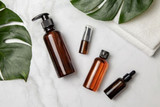Why You Need To Store These 3 Foods In Glass Jars
The food industry has long been making use of glass jars for packaging specific products. Glass packaging has scientifically been proven to be beneficial for food preservation and safety.
Here are a few food items that must always be packaged in glass jars.
Jams & Jellies

Jams and jellies are breakfast staples in the American household. Whether it’s a classic marmalade or a strawberry jam, you’ll see the colorful jars in almost everybody’s refrigerator. Just as iconic is the food itself, so is the glass packaging it comes in.
Jams are hot hot-fill products. What this means is that they’re poured and sealed into their containers when they’re at or above 85 degrees. This temperature is essential for the jam to maintain its consistency, or else it may become moldy and degrade. Therefore, plastic containers are an absolute no-go for these fruity delights as they can’t withstand the high temperature of the jam.
On the other hand, glass jars can perfectly hold the contents without exploding or deteriorating in the process. Moreover, the acidic and corrosive ingredients of the jam don’t react with glass, maintaining both its taste and the container shape.
Pickles
Another food item visibly seen in glass jars are pickles. Manufacturing companies usually follow one of the three major production processes. Some follow the refrigeration technique, where the pickles are placed in the jars and filled with brine. The jar is then simply refrigerated in stores until it’s purchased by customers. Other companies prefer pasteurizing their pickles. Here the jars are filled in the same manner, but are sealed with a vacuum closure.
In the natural fermentation process, sugars are first converted into acids after the pickles and brine are placed together in a vat. The mixture is then transferred to glass jars, and sealed with a non-vacuum closure.
The brine and acids present in the pickle mix contain ions that can readily react with metal or plastic containers. This can result in oxidation or reduction, affecting the taste and also damaging the container. The inertness of glass jars preserves the pickles in the way they’re meant to be stored.

Olive Oil
Cooking oils, especially olive oils, are also popularly stored in glass containers. These are usually available in dark colored glass jars to reduce the chances of exposure to sunlight. However, clear glass jars are also used for olive oil.
The glass containers are usually placed at the back of shelves, or in darker places. This is done to mitigate the chances of light exposure, as olive oil needs less than 54 degrees for a prolonged shelf life. The reflective properties of glass jars and bottles make them suitable to contain olive oil. In fact, many customers tend to transfer the oil sold in large plastic bottles to smaller glass jars after purchase, to make it last longer.
Want to maintain the integrity of your food product? Partner up with PremiumVials for safe packaging! Our extensive range of food packaging items includes high quality glass jars, barrier bags, standup pouches, and child proof dispensary bags.
Get in touch with us to learn more about our shipment and return policy!
Recent Posts
-
Why Should You Choose Amber Glass When Packaging Beauty Products?
Designing a line of beauty products is no simple task. So many details go into planning and crafting …7th Jul 2022 -
Candle Supplies - The Benefits of Using Tins for Your Candle Business
Candle business is a fantastic way to turn a hobby into an extra income stream. For those willing an …7th Jul 2022 -
Customize your packaging and protect your products during shipping
Customize your packaging and protect your products during shipping. Our custom partitions are made i …5th Jul 2022



